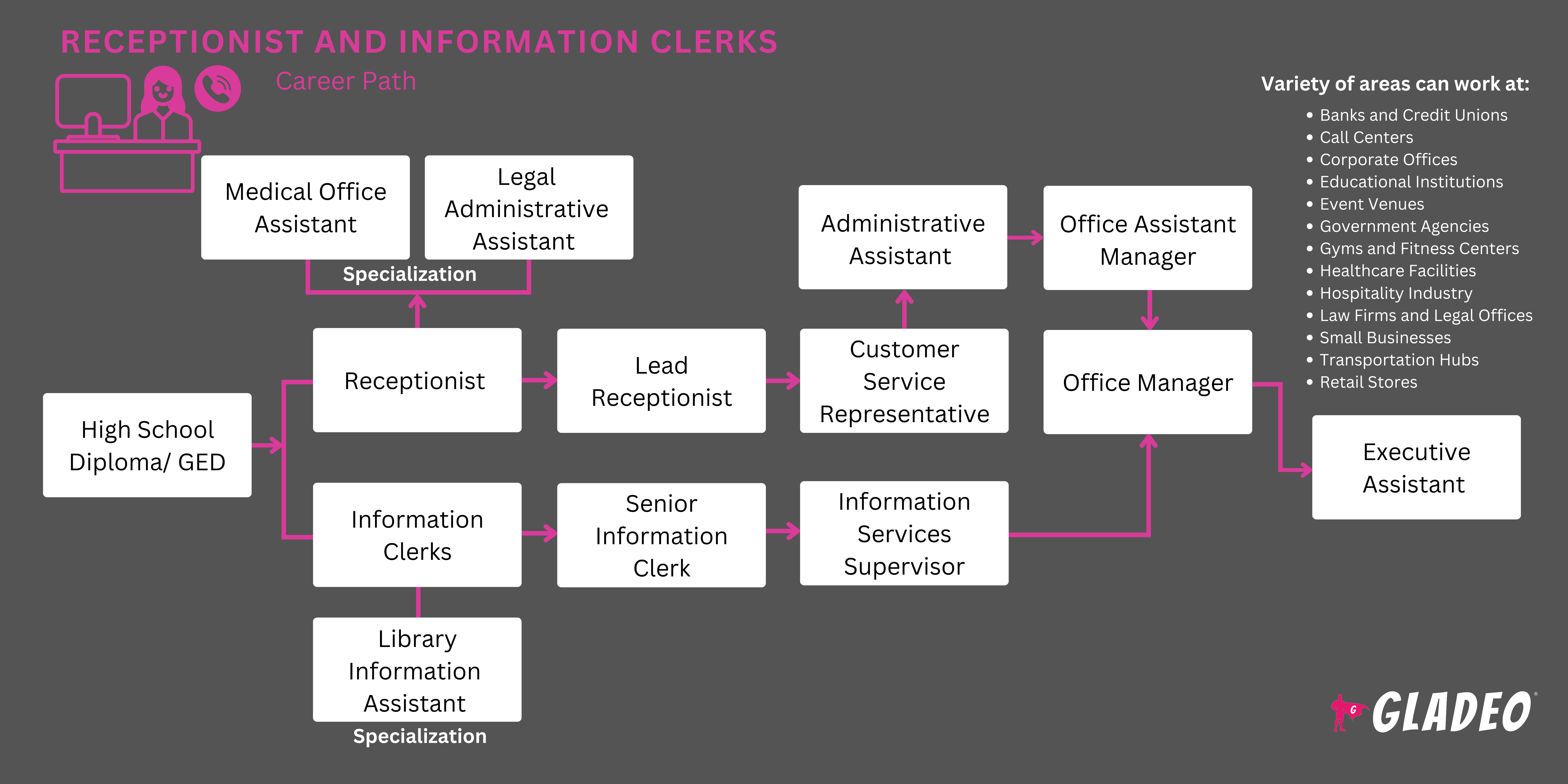스포트라이트
Clerk Specialist, Front Desk Receptionist, Greeter, Member Service Representative, Office Assistant, Receptionist, Scheduler, Information Assistant
For many businesses, the first point of contact they offer to customers and visitors is a Receptionist or Information Clerk. These professionals are front and center, shaping the initial impressions of the organizations they represent.
They answer phones, provide general information, direct people to where they need to go, and manage schedules and other administrative tasks such as mail handling, supply ordering, and record keeping. Beyond their normal duties, they’re frequently tagged to help with lots of other things like event planning, fire and safety duties, building security, vendor management, financial tasks, and general housekeeping.
The role also requires great customer service skills as well as problem-solving, multitasking, and adaptability. This versatility makes them indispensable, as they bridge gaps between various departments and help to ensure seamless operations!
- Being at the forefront of an organization’s public relations
- Directly interacting with and assisting a diverse range of people
- Learning a wide range of duties and responsibilities
- Opportunities for growth into other administrative roles
- Playing a vital role in the smooth operation of an organization
근무 일정
- Receptionists and Information clerks usually work full-time. Schedules depend on the industry, with some positions working at night or on weekends.
일반적인 업무
- Greet customers, guests, and other visitors warmly. Determine the purpose of their visit and direct them to appropriate destinations.
- Monitor visitor access and maintain security protocols, such as issuing visitor badges.
- Assist with VIP visits such as special requirements or protocols.
- Answer, screen, and forward incoming calls, emails, and correspondence. Provide information or take messages.
- Schedule and confirm appointments. Maintain and update staff calendars.
- Collect, sort, distribute, and prepare incoming and outgoing mail and packages.
- Provide information about the organization’s services, policies, and locations.
- Perform administrative support tasks such as data entry, filing, photocopying, taking meeting notes, etc.
- Order and maintain inventory of office supplies for the reception area.
- Operate office equipment, including fax machines, copiers, phone systems, audiovisual equipment, projectors, etc.
- Coordinate with maintenance staff, vendors, package delivery providers, and other visitors.
- Manage digital and physical records. Maintain confidentiality of sensitive information in compliance with company policies and/or state or federal guidelines.
- Assist with fire and safety-related duties and building security, to include emergency response plans.
- Aid with financial tasks, as needed, such as budget management or buying items with organizational credit cards or processing travel vouchers.
- Help with travel arrangements, such as booking airline tickets and hotel accommodations.
추가 업무
- Notify appropriate personnel of visitors, deliveries, or urgent messages.
- Provide support in coordinating special events, meetings, and training sessions.
- Assist in preparing reports, presentations, or meeting materials.
- Support marketing efforts by distributing promotional materials to visitors.
- Collect and process payments or fees for services when required.
- Maintain contact lists and directories for the organization.
- Assist with social media or website updates.
- Report maintenance or technical issues within the office space.
- Train and mentor junior reception staff on office procedures and customer service standards.
- Perform general housekeeping duties, such as watering plants or cleaning break areas
소프트 스킬
- 정확도
- 적응성
- 디테일에 대한 관심
- 커뮤니케이션
- 집중력
- 기밀 유지
- 고객 서비스 오리엔테이션
- 세부 사항 중심
- Efficiency
- 초점
- 듣기
- 멀티태스킹
- 조직
- 인내심
- 전문적인 태도
- Punctuality
- 책임
- 시간 관리
기술 능력
- Proficiency in multi-line phone systems
- Email management
- Calendar and scheduling software
- Data entry and database management
- Office software proficiency
- Document management systems (e.g., SharePoint, Google Drive)
- Operation of office equipment (fax machines, copiers, printers, audiovisual equipment)
- Visitor management systems
- Security and access control systems
- Mail processing and shipping software
- 재고 관리 소프트웨어
- Financial transaction processing
- Digital record management and compliance (e.g., HIPAA, GDPR)
- 프레젠테이션 소프트웨어
- Social media management platforms
- Website content management systems (e.g., WordPress, Wix)
- Basic troubleshooting for office equipment and IT systems
- Event management software
- 여행 준비
- Emergency response systems and protocols (e.g., fire alarm panels, evacuation plans)
- Corporate offices
- 교육 기관
- 정부 기관
- Hotels and resorts
- Medical and dental offices
Receptionists and Information Clerks are expected to provide excellent customer service and manage front desk operations efficiently. As the first point of contact between an organization and visitors, they have to make a solid first impression and do their best to remain professional and courteous even in challenging situations. Sometimes, they must calmly help during emergencies and other unexpected stressful situations. Thus, the role requires plenty of patience, strong communication skills, and the ability to stay calm under pressure.
Effective time management is essential for receptionists to juggle multiple responsibilities. This includes managing appointments, addressing inquiries, and handling administrative tasks. Prioritizing and staying organized is key to their success.
As with many fields, technology is changing the role of Receptionists and Information Clerks. These days, they’ve got to be tech-savvy and fairly proficient with a wide range of software programs, for everything from customer relationship management to teleconferencing, ordering supplies online, updating websites, and other tasks.
Automated systems and virtual receptionists are becoming more common, but having a human presence on-site is still irreplaceable for most organizations. There’s always been an emphasis on customer service, but with the proliferation of online review platforms – where one upset customer can post a harsh review in seconds – many businesses are keen to ensure every customer experience is positive.
People who excel as Receptionists and Information Clerks often enjoyed helping others, organizing events, and communicating with a wide range of people. They likely took pleasure in ensuring things ran smoothly under their watch!
- There are no formal training requirements, but usually Receptionists and Information Clerks need a high school diploma or GED.
- Some basic vocational training or community college courses can be helpful, in topics like:
- Basic accounting and budgeting
- Business communications
- 충돌 해결
- 고객 서비스
- Data entry
- Document preparation
- Front desk operations and security protocols
- Office administration
- Records management
- Scheduling and calendar management
- Social media and digital communication
- Telephone etiquette
- 시간 관리
- Workplace diversity and inclusion
- Workplace safety and emergency procedures
- Students can get hands-on practice through internships or volunteer opportunities to build real-world experience.
- Most employers will offer on-the-job training on position-specific duties.
- Optional certifications such as the International Association of Administrative Professionals’ Certified Administrative
Professional or the American Society of Administrative
Professionals’ Professional Administrative Certification of Excellence may demonstrate to employers that you’re committed to the profession.
Receptionists and Information Clerks don't require a college degree, but for those who plan to attend a training program, look for programs featuring:
- Accreditation by a recognized accrediting authority.
- Instructors with real-world industry experience.
- State-of-the-art equipment and AI software.
- Opportunities for hands-on experience via internships.
- Flexible class schedules.
- Career services offering job placement and resume help.
- Competitive tuition and fees, as well as scholarship and financial aid options.
Many vocational schools, community colleges, and online training programs offer relevant classes and certificates in Receptionist-related administrative duties. Online platforms include:
A few specialized training programs are offered by professional organizations such as:
- The American Society of Administrative Professionals’ Professional Administrative Certification of Excellence
- The International Association of Administrative Professionals’ Certified Administrative Professional
- English composition, language arts, and typing are important classes to do well in during high school.
- Engage in classes and activities where you can practice listening, record keeping, time management, and other soft skills.
- Look for customer-facing part-time jobs, internships, or volunteer opportunities.
- Ask a working Receptionist or Information Clerk if they’ll do an informational interview with you.
- Consider freelancing as a virtual assistant on Upwork, Freelancer, or other sites to gain more experience while getting paid!
- Stay informed about industry trends and advancements in office technology.

- Apply for jobs on portals such as Indeed, Simply Hired, or Glassdoor. Also look on Craigslist for local opportunities.
- Consider internships or part-time jobs to get your foot in the door.
- Review Receptionist resume templates to get ideas for formatting and phrasing.
- Note the keywords listed in job ads and try to incorporate them into your resume, such as:
- 디테일에 대한 주의
- 커뮤니케이션 기술
- Customer Service
- Front Desk Operations
- Microsoft Office 제품군
- 멀티태스킹
- Organizational Skills
- Phone Etiquette
- Scheduling Appointments
- 시간 관리
- Look for part-time jobs, internships, apprenticeships, or anything to get your foot in the door.
- Ask your school’s career center for help with resumes, mock interviews, and job searches.
- Reach out to your professional network for tips about job openings because many jobs aren’t widely advertised online.
- Ask your professors, supervisors, and peers if they’ll serve as personal references.
- Start freelancing on Upwork, Fiverr, and related sites.
- Study Receptionist interview questions, such as:
- “How do you handle a busy front desk with multiple phone lines and visitors?”
- “Can you describe your experience with scheduling appointments and managing calendars?”
- “What strategies do you use to stay organized and prioritize tasks effectively?”
- When you get called for an interview, research the employer to learn more about them so you can speak a bit about how you’d fit into the work culture.
- Before the interview, run through some more mock interviews with a friend, specific to that employer and position.
- Always dress appropriately for job interview success and have some questions lined up to ask them, too!
- After interviews, send thank-you emails to express your gratitude and restate your interest in the position.
웹 사이트
- American Society of Administrative Professionals
- International Association of Administrative Professionals
- National Association of Professional Receptionists
- The Receptionist
도서
- The Administrative Professional: Technology & Procedures, by Patsy Fulton-Calkins and Dianne Rankin
- The Office: Procedures and Technology, by Mary Oliverio, et al.
Receptionists and information clerks are the welcoming face of their organizations, ensuring smooth operations and excellent customer experiences. If you’re considering alternatives to a career as a receptionist or information clerk, related careers include:
- 관리 도우미
- Bank Teller
- 카운터 및 렌탈 직원
- 법원 리포터
- 고객 서비스 담당자
- Data Entry Clerk
- 편집기
- 이벤트 코디네이터
- Executive Assistant
- Health Information Technologist
- Information Clerk
- Interpreter
- 법무 비서
- 의료 보조
- Medical Billing and Coding Specialist
- 의료 기록 전문가
- 사무실 관리자
- Patient Representative
- Personal Assistant
- Switchboard Operator
- 전사 전문가
- 번역기
- 작성자
뉴스피드

주요 채용 정보

온라인 강좌 및 도구

연봉 기대치
New workers start around $30K. Median pay is $35K per year. Highly experienced workers can earn around $40K.






